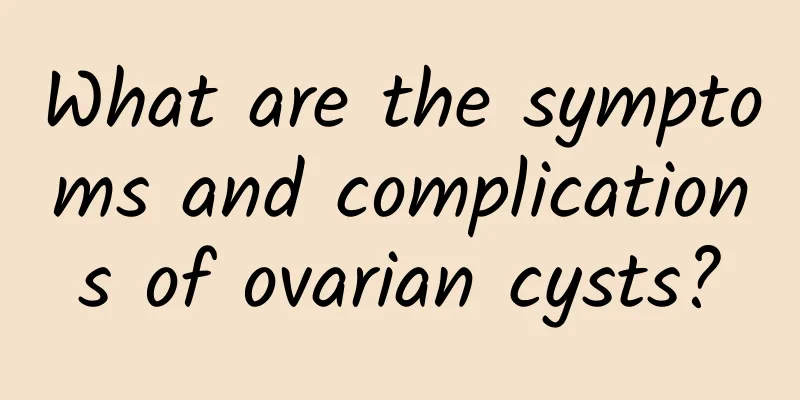What are the symptoms and complications of ovarian cysts?

|
What are the symptoms of ovarian cysts? What are the complications? Ovarian cysts have no obvious clinical manifestations in the early stages. Experts say that the symptoms of ovarian cysts are: 1. Abdominal pain: Ovarian tumor torsion, rupture or infection, detachment of uterine fibroids or degeneration of fibroids can cause severe lower abdominal pain. 2. Changes in diet and urine: The early symptoms of ovarian cancer may be just abdominal distension and digestive tract symptoms. Tumor compression or invasion of the bladder and rectum can cause frequent urination, difficulty urinating, dry stools, etc. 3. Menstrual changes: When tumors grow in the uterus, such as uterine fibroids, endometrial cancer, uterine sarcoma, and choriocarcinoma, menstrual abnormalities may occur, including menorrhagia, irregular periods, prolonged menstruation, spotting, etc. 4. Abnormal vaginal discharge: When a female reproductive tract cyst ruptures and becomes necrotic, watery, bloody, or rice-like vaginal discharge may occur. If combined with infection, it may have a peculiar smell. In fact, untimely treatment of ovarian cysts can lead to the following complications: 1. Cyst rupture: About 3% of ovarian tumors will rupture, and the ovarian tumor pedicles will twist, which is traumatic and spontaneous. After the cyst ruptures, it often causes severe abdominal pain, nausea and vomiting, and sometimes causes internal bleeding, peritonitis and shock. 2. Infection: Less common, mainly caused by tumor torsion or rupture, but also from the spread of appendix abscess and other adjacent organ infection. Antibiotics should be used for treatment, followed by surgical removal of the tumor. If the infection cannot be controlled in the short term, surgery should be performed immediately. 3. Pedicle torsion: It is one of the acute abdominal diseases in gynecology. About 10% of ovarian tumors are complicated by pedicle torsion. 4. Malignant changes: Malignant changes of benign ovarian cysts often occur in older women, especially after menopause. The cysts increase rapidly in a short period of time. Patients feel abdominal distension and loss of appetite. The cysts increase significantly in size, become fixed, and contain a lot of ascites. |
<<: Is chronic cervicitis serious?
>>: What are the symptoms of cervical precancerous lesions?
Recommend
Women with dysmenorrhea can't afford it
Women are the most vulnerable during their menstr...
Netizens asked: Will induced abortion lead to infertility?
Induced abortion surgery is welcomed by many peop...
What should girls do if they have pain during their period?
Girls can first apply hot compresses when they ha...
Only 10 days! Have a tight buttocks like this
In the summer when body curves are exposed, are w...
How to eat on a weight loss diet? Drink this cup before meals to lose weight and burn fat more efficiently
If you want to lose weight successfully, you must...
When your period is about to "leave", your body will give you 5 tips to help you safely and smoothly go through menopause
Ms. Li, 47 years old, sat in the chair opposite m...
What are the complications of irregular menstruation?
There are many causes of irregular menstruation, ...
What are the symptoms of uterine fibroids? Will uterine fibroids reduce menstrual flow?
There are many causes of uterine fibroids, most o...
Afraid of obesity, reject fat and dare not eat oil? Mediterranean diet with olive oil can fight inflammation and prevent cardiovascular disease
For those who are worried about gaining weight, t...
Squats aren’t the only way to get a perky butt! 5 yoga tiger poses to lift your buttocks and slim your thighs
Who says that being sexy requires having big brea...
How much does cervical erosion surgery cost?
How much does cervical erosion surgery cost? The ...
What diseases should be differentiated from pelvic peritonitis?
In daily life, we should pay attention to the dev...
What are the best dishes for patients with uterine fibroids? What foods should patients with uterine fibroids not eat?
What are the best dishes for patients with uterin...
Patients with pelvic inflammatory disease should not lose weight excessively
Excessive weight loss and deliberate dieting by p...
Is it that difficult to lose weight? Nutrition experts: 7 misconceptions that hinder weight loss
Is it difficult to lose those extra kilos? The an...









